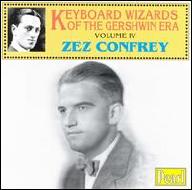Upon discharge from the Navy, Zez Confrey joined the QRS piano-roll company as a pianist and roll editor. Confrey would make nearly 200 piano rolls during his lifetime, mostly editing them himself. Zez Confrey was regarded as one of the sharpest roll editors in the business, especially when it came to his own compositions. One of his first QRS rolls was an original number entitled My Pet, and with this work Zez Confrey single-handedly ushered in the field of novelty ragtime, a style that took on structural features of French Impressionism and did not suffer amateur pianists gladly (although they were nonetheless welcome to try!). In 1921, Confrey scored a huge hit with Kitten on the Keys, which sold over a million sheet-music copies and made Zez Confrey a household name in popular music; over time, Kitten on the Keys would become the third most-frequently recorded rag in history, after Scott Joplin's Maple Leaf Rag and Twelfth Street Rag by Euday Bowman. Also in 1921, Confrey began to make phonograph records, and by 1932 had appeared on records made for Edison, Emerson, Brunswick, Victor, and HMV. In the case of the last three concerns, Confrey was backed by a pickup orchestra, usually led by Walter Gus Haenschen or Nathaniel Shilkret. Confrey didn't take making recordings nearly as seriously as he did making rolls and publishing sheet music -- in one case it is known that pianist Phil Ohman sat in for Confrey on one of the records by "his" orchestra.
On February 12, 1924, Zez Confrey appeared as a soloist, billed above George Gershwin, in a few numbers at the historic Experiment in Modern Music concert at Aeolian Hall, where Gershwin's Rhapsody in Blue was premiered. Later that year Confrey moved from QRS to the Aeolian company, but by the late '20s, Confrey's roll-editing output began to slow down. He continued to compose and publish music until his retirement after World War II. Zez Confrey's extensive output ultimately contained many character pieces for piano, pop songs, mini-operas, and teaching pieces. Afterwards, Confrey's celebrity faded, and in the end he succumbed to Parkinson's disease at the age of 76.
Despite the variety of works Zez Confrey undertook, it is as the "King of Novelty Ragtime" that his reputation is made. In addition to Kitten on the Keys, Confrey is also known for the popular song Stumbling (1921) and pieces such as You Tell 'Em Ivories (1921), Coaxing the Piano (1922), Dizzy Fingers (1923), and Nickel in the Slot (1923). These are all considered classics of the novelty ragtime genre, and a few have even become standards within instrumental jazz and pop literature as well. Zez Confrey wrote his last novelty rag, Giddy Ditty, in 1935. ~ Uncle Dave Lewis, Rovi












